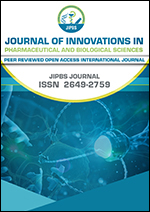
CODEN (USA): JIPBBW
Crossref DOI Prefix: 10.56511
Publication Ethics and Malpractice Statement
Journal of Innovations in Pharmaceutical and Biological sciences (JIPBS) Publication Ethics and Publication Malpractice Statement is based, in large part, on the guidelines and standards developed by the Committee on Publication Ethics (COPE).
Journal of Innovations in Pharmaceutical and Biological sciences (JIPBS) is dedicated to following best practices on ethical matters, errors and retractions. The prevention of publication malpractice is one of the important responsibilities of the editorial board. Any kind of unethical behavior is not acceptable. Authors submitting articles to JIPBS affirm that manuscript contents are original. The relevant duties and expectations of authors, reviewers, and editors of the journal are set out below.
Role/Duties/Responsibility of Editor
Role/Duties/Responsibility of Reviewers
Role/Duties/Responsibility of Authors

CODEN (USA): JIPBBW
Crossref DOI Prefix: 10.56511

 Journal of Innovations in Pharmaceutical and Biological Sciences is licensed under a Creative Commons Attribution-NonCommercial-ShareAlike 4.0 International License. Based on a work at https://jipbs.com. Permissions beyond the scope of this license may be available at https://jipbs.com
Journal of Innovations in Pharmaceutical and Biological Sciences is licensed under a Creative Commons Attribution-NonCommercial-ShareAlike 4.0 International License. Based on a work at https://jipbs.com. Permissions beyond the scope of this license may be available at https://jipbs.com